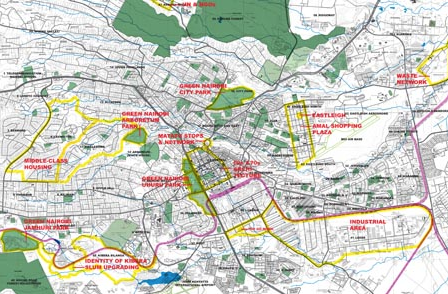Nairobi 2007

Instead of understanding the city as a system composed of binary opposites, such as formal and informal parts, the study of Nairobi attempts to unfold the very complex simultaneity and dependencies of these parameters, by carefully tracing the basic human activities and their spaces that they unfold in. Instead of an approach centered around the preconceived grand dichotomies, we would like to focus on the activities on the local scale. The research methods that have been developed in the past, such as precise observation and mapping tools, obtain an urgency and a (political) pivotal significance in an environment where facts are often non-transparent and space is the medium where debates, negotiations of power and conflict are played out.
The topics are:
Nairobi A City Without A Masterplan?
Nairobi’s Architectural Legacy from the 1960s and 70s
Industrial Area
The Waste Network
Pentecostal Churches in Nairobi
Kibera as a City
Slum Upgrading in Kibera
Somali Refugee as a Urban Catalyst
UN & NGOs in Nairobi
Matatu Culture

